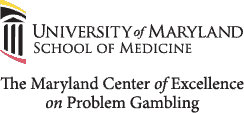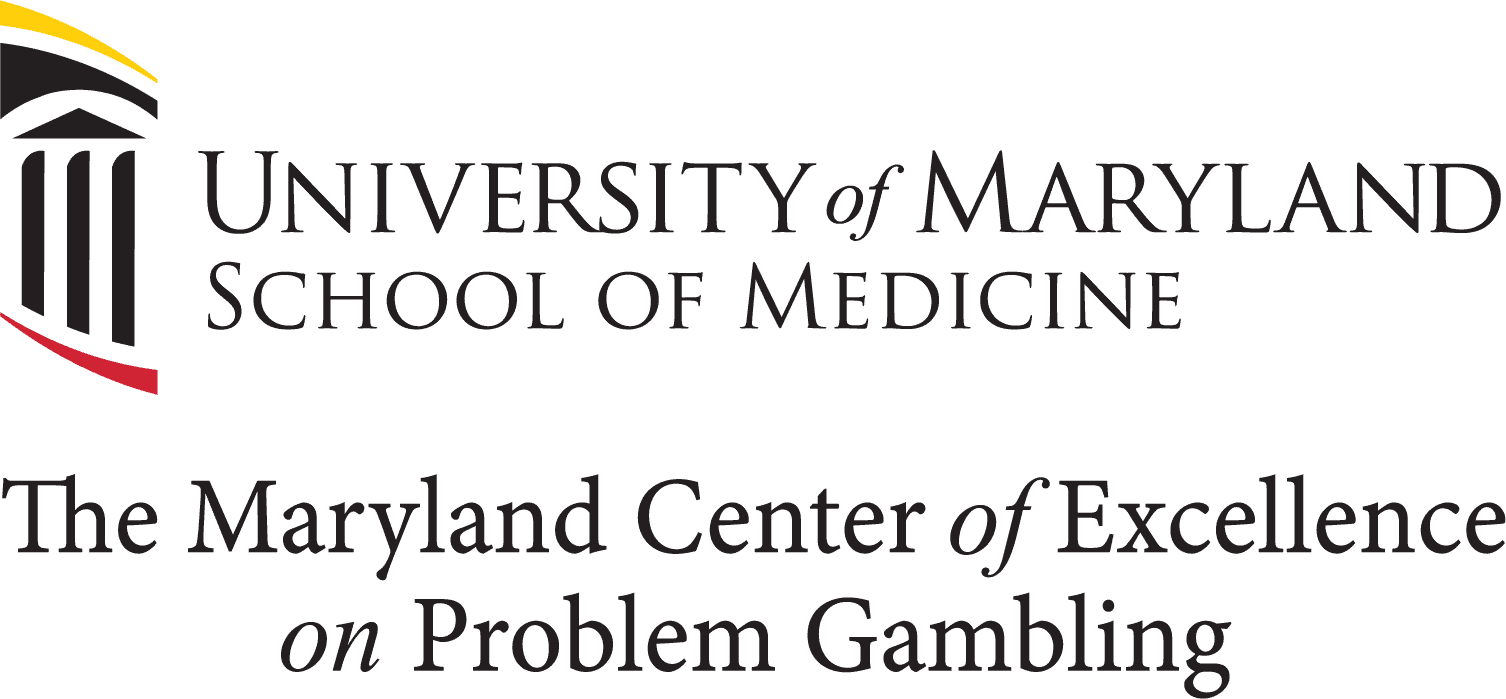Problem Gambling Webinar Series FY22
We invite you to join the Maryland Center of Excellence on Problem Gambling (the Center) for the 2021-2022 series of FREE webinars designed to provide additional problem gambling prevention, clinical and recovery training on a variety of topics. Webinars are one (1) hour in length, 12:00-1:00 PM EDT and award one (1) CEU (unless otherwise specified).
Friday, October 29, 2021
Problem Gambling Among Military and Veteran Populations
Presented By:
There are substantial risks for those currently serving or who have served in the military to be faced with a gambling problem; a problem not only impacting them, but others in their lives. The Government Accountability Office (GAO) made a clear and strong recommendation that all branches of the military screen, assess and provide treatment for Gambling Disorder. Furthermore, the most current Defense Department Authorization Act has mandated that all services screen for Gambling Disorder. However, there has yet been a systemwide approach to integrating GD into existing addiction and behavioral health services within the Department of Defense or Veterans Administration. This training will address the special needs and risk factors among active duty service members and veterans around problem gambling. Co-occurring issues such as PTSD and suicide will also be discussed.
Attendees should be able to:
- Identify scope of problem gambling in active duty military and veteran populations
- Identify problem gambling risk factors for those serving in the military
- Adapt treatment strategies to best align with military and veteran groups
Friday, November 18, 2022
'Tis the Season for Gifting Responsibly: Avoid Underage Lottery Play and Engage in Responsible Gambling
Presented By:
December is the season for festive celebrations, generosity and family gatherings. Every December, the National Council on Problem Gambling (NCPG), lotteries across the Country, and community organizations promote gifting lottery tickets responsibly for the holiday season. Year round, The Center collaborates with the MLGCA and community organizations to promote responsible gambling, including underage gambling prevention. Join us for an interactive webinar and learn of strategies implemented by the Center and MLGCA to promote responsible gambling and how you can prevent underage gambling and promote responsible gambling within your organization and your community.
Participants will be able to:
- Learn about youth gambling and the risks of gambling at a young age.
- Learn what MLGCA does to promote the Gift Responsibly campaign and prevent underage gambling during the holidays and year-round.
- Learn about underage and problem gambling prevention strategies for youth that have been implemented in Maryland over the last few years through the Center’s prevention grant programs.
- Utilize resources and tools for awareness within the 2022 Holiday Awareness Guide for Behavioral Health Providers and Preventionists.
Friday, January 14, 2022
Self-compassion and Resilience for Healers Working with Trauma and Gambling Disordered Clients
Presented By:
Attendees should be able to:
- Define the term compassion fatigue and identify symptoms of the impact of caring/compassion fatigue with gamblers.
- Identify the impact/effect that being a helping professional has on physical and emotional well-being.
- Improve self-care skills by learning mindfulness techniques and methods of applying them in the therapeutic relationship with gamblers and trauma survivors.
- Identify the number of reasons why it is essential for healers to remain resilient in response to the demands of our work.
Friday, December 17, 2021
Gambling is NOT the Solution to Financial Woes: Understanding the Stress of Problem/Disordered Gamblers During the Holidays and in the New Year.
Presented By:
The holiday season and the beginning of a New Year can heighten anxiety for those who grapple with addiction; mental stress can be heightened, and financial strain stretched to the limit. For those who are affected by problems caused by gambling, stress at this time of year can be magnified to new levels – especially when gambling is viewed as a financial solution. Join us for this special webinar to listen as the Center’s Peer Recovery Support Specialists share their personal experiences with gambling addiction and learn financial empowerment strategies to assist your clients and communities.
Attendees should be able to:
- Understand through personal stories how problem gambling and gambling disorder can heighten stress during the holiday and in the New Year.
- Identify tools and strategies to assist in assessing and intervening with clients in financial distress.
- Learn the tools and resources offered by the Center, including Peer Support.
Friday, November 19, 2021
‘Tis the Season for Gifting Responsibly: Avoid Underage Lottery Play and Engage in Responsible Gambling
Presented By:
December is the season for festive celebrations, generosity and family gatherings. Every December, the National Council on Problem Gambling (NCPG), lotteries across the Country, and community organizations promote gifting lottery tickets responsibly for the holiday season. Year round, The Center collaborates with the MLGCA and community organizations to promote responsible gambling, including underage gambling prevention. Join us for an interactive webinar and learn of strategies implemented by the Center and MLGCA to promote responsible gambling and how you can prevent underage gambling and promote responsible gambling within your organization and your community.
Attendees should be able to:
- Learn about youth gambling and the risks of gambling at a young age.
- Learn what MLGCA does to promote the Gift Responsibly campaign and prevent underage gambling during the holidays and year-round.
- Learn about underage and problem gambling prevention strategies for youth that have been implemented in Maryland over the last few years through the Center’s prevention grant programs.
- Utilize resources and tools for awareness within the 2021 Holiday Awareness Guide for Behavioral Health Providers and Preventionists.
Friday, October 1, 2021
Gambling Disorder and Co-occurring Disorders
Presented By:
What is the relationship between gambling problems and psychiatric disorders? This webinar will deepen your understanding of the underlying causes and conditions that contribute to the development and maintenance of addictions. You will learn about the challenges that clinicians face in providing treatment for those who struggle with co-occurring disorders.
Attendees should be able to:
- Identify the impact of gambling among individuals diagnosed with psychiatric illnesses
- Identify at least three commonly perceived benefits of gambling for individuals with psychological disorders.
- Identify treatment approaches to address gambling problems among those with psychiatric conditions.
Friday, January 28, 2022
Maryland Sports Betting is Here: Implications from a Policy, Prevention, and Treatment Perspective
Presented By:
Heather Eshleman, MPH, Prevention Manager
Kristen Beall, LCSW-C, CAC-AD, Clinical Manager
The first sports betting licenses were issued in December 2021, creating a new avenue for betting in Maryland. Understand from various perspectives how access to a new way of gambling, Sports Betting, can impact your community. In this webinar we will discuss the Maryland policies on sports betting and how they may promote or discourage safe gambling. Hear about prevention strategies that can be used to avert underage gambling and encourage adults to gamble safely. In addition, from a clinical perspective, learn methods that can be used to identify and treat those who may be showing signs of a sports betting or gambling problem.
Attendees should be able to:
- Consider the sports betting policies in Maryland and their potential impact on the community
- Understand problem gambling prevention strategies that can be implemented to encourage responsible gambling in Maryland.
- Understand the evidenced-based screening tools and treatment strategies relevant to problem gambling and gambling disorder.
Friday, February 11, 2022
Positive Psychology: A Strength Based Approach to Working with Gamblers
Presented By:
Attendees should be able to:
- Learn what Positive Psychology is and how it can be applied
- Learn how a strength-based approach to gambling treatment helps to improve treatment outcomes
- Develop a greater understanding of how to employ the principals of Positive Psychology into healthy lifestyle choices for the gambler and their families
- Learn how to create the therapeutic conditions to allow our clients to thrive
Friday, February 25, 2022
Join Us! March Problem Gambling Awareness Month (PGAM): A Collaborative Approach Across Sectors
Presented By:
Patrick Martin, Vice President, Regional Compliance, MGM National Harbor
Brenda McNelis, Regulatory Compliance Officer at Ocean Downs Casino
Heather Eshleman, Prevention Manager
Problem Gambling Awareness Month (PGAM), held each March, is a grassroots public awareness and outreach campaign created and sponsored by the National Council on Problem Gambling to educate the general public, behavioral health providers and preventionists, businesses, and community organizations on problem gambling. “March Problem Gambling Awareness Month” is an opportunity to showcase how different entities bring awareness to problem gambling. Through this webinar, learn what the Maryland Lottery, MGM National Harbor, and the Center do to promote PGAM. Learn about the Maryland Alliance on Responsible Gambling and other Maryland resources for promoting safe gambling all year long. Learn how you can participate in PGAM!
Attendees should be able to:
- Learn the history of Problem Gambling Awareness Month and why it is important to raise awareness of problem gambling.
- Learn how the Maryland Lottery and MGM National Harbor promote responsible gambling.
- Learn about the collaboration and responsible gambling strategies of the Maryland Alliance on Responsible Gambling (MARG).
- Learn about materials in the Center’s Problem Gambling Awareness Month toolkit that you can use in your workplace and community to raise awareness of problem gambling and resources for help.
Friday, March 25, 2022
Best Practices in the Treatment of Gambling Disorder
Presented By:
This webinar will explore and review various therapeutic approaches to working with clients that suffer with a Gambling Disorder. The topics for discussion will include: the therapeutic challenges for the clinician, engagement strategies, obstacles to treatment, motivational interviewing, CBT, and mindfulness based practices.
Attendees should be able to:
- Participants will learn how to apply evidence based practices in the treatment of Gambling Disorder.
- Participants will develop an understanding of the complexities of the therapeutic processes that are unique to Gambling Disordered individuals.
- Participants will be learn various techniques to improve treatment outcomes for those who have a Gambling Disorder.
Friday, June 24, 2022
Celebrating National Minority Mental Health Awareness Month: Focusing on Health Equity in Problem Gambling Prevention
Presented By:
Heather Eshleman, MPH, Prevention Manager
James Nowlin, Peer Recovery Support Specialist
National and Maryland data show minority populations are at greater risk of problem gambling. This webinar will show data and research findings indicating this heath disparity and discuss reasons why minority populations may be at greater risk. The Maryland Council on Problem Gambling will discuss successes and challenges of the faith-based communities wellness grants initiative. The Center will highlight problem gambling prevention strategies implemented through youth and special populations grant programs. Recommendations for how your organization can promote health equity, raise awareness of responsible gambling, and promote resources for help will be discussed.
Attendees should be able to:
- Learn the most recent data on minority gambling behaviors and why this population may be at greater risk of problem gambling.
- Learn about the faith-based communities wellness grants initiative.
- Learn about strategies implemented through the youth and special populations grant program reaching minority populations.
- Learn how your organization can get involved with increasing health equity related to responsible gambling and promoting resources for help.
Friday, April 8, 2022
Update on SBIRT
Presented By:
Summary: Research evidence has been accumulating indicating that unidentified problem gambling contributes to increased treatment costs and decreased treatment effectiveness across behavioral and general health care settings. This presentation will review the most commonly employed, evidenced-based brief problem gambling screening instruments currently in use. Research based as well as clinical evidence will be used to discuss pros and cons of screening strategies and to recommend an effective screening, brief intervention and referral process.
Attendees should be able to:
- Participants will be able to identify key elements to effective screening for gambling problems
- Participants will be able to identify strategies to initiate discussion of the impact of gambling in a variety of health care settings
- Participants will be able to describe the current research on the development of a gambling SBIRT
Friday, April 29, 2022
Celebrating Asian American and Pacific Islander Heritage Month: Focusing on Gambling Behaviors Among Maryland’s Asian Population and Strategies to Prevent Problem Gambling
Presented By:
Hyang (Ana) Park, Program Director, My Life Foundation
Heather Eshleman, MPH, Prevention Manager
Kenneth Crawford, CPRS, CRS, Certified Peer Recovery Specialist
National and State data show Asians are at an increased risk of problem gambling compared to the Caucasian population. This webinar will show data and research findings indicating this heath disparity and discuss reasons why the Asian population may be at greater risk of problem gambling behaviors. My Life Foundation, a community organization in Maryland, will discuss how they have integrated problem gambling prevention strategies with their mental health promotion and substance misuse prevention programming to reach the Korean population. Recommendations for how your organization can assist with expanding problem gambling prevention work within the Asian community and resources for help will be discussed.
Attendees should be able to:
- Learn the most recent data on Asian gambling and why this population may be at greater risk of problem gambling.
- Learn about problem gambling prevention strategies targeting the Korean community implemented in collaboration with My Life Foundation.
- Learn easy and low-cost public awareness and prevention strategies to promote responsible gambling among the Asian population.
Friday, May 13, 2022
Promoting Resilience in The Family: Working with the Families of those with a Gambling Disorder
Presented By:
The family members of the problem gambler experience a great deal of emotional strain and stress. Families need support and assistance to restore balance and psychological equilibrium. Join us for this interesting and informative presentation on family dynamics and building family resilience. Learn how to help families heal, grow, and recover. This workshop will address the treatment issues that are common and unique when working with the families of the problem gambler.
Attendees should be able to:
- To learn the definition of resilience and how to promote it.
- To develop an increased understanding of how to build resilience in the family of the problem gambler.
- To increase understanding of relevant family issues involved in the treatment of problem gamblers
- To learn therapeutic techniques to promote the recovery of the problem gambler and their family.
Friday, May 20, 2022
Guess Who’s Coming to Problem Gambling Treatment, Prevention, and Community Wellness? What’s On Your Menu?
Presented By:
Remember Sidney Portier in the amazing “Guess Who’s Coming to Dinner?” Well, over 50 years later while there is diversity progress, we still appear surprised when treatment is available, but the numbers are quite low. Is it possible that mental health “menus” still rely on traditional theoretical and service delivery models lacking goodness-of-fit among culturally diverse individuals, families and communities? Less than 5% seek disordered gambling treatment (ncpgambling.com), and our treatment models and prevention efforts often lack cultural modifications to support communities we purport to support. Why aren’t we developing community wellness opportunities to meet the 95% who are not treatment seeking? Restaurants alter their menus regularly to meet customer needs. When will we make the necessary diversity, equity and inclusion strategic changes to appeal to the interests and desires of communities we serve? Are we willing to do a major overhaul? This session will challenge us to dig deeper and develop transformative DEI strategic plans to expand advocacy, treatment and prevention to meet the changing needs of communities during a pandemic and post-pandemic world.
- Identify “old” menu barriers to culturally accessible gambling disorders treatment, prevention, and community wellness.
- Highlight the benefit of adopting a health equity and social justice lens to expand problem gambling awareness and advocacy among culturally diverse communities.
- Provide “new menu” tips for developing community wellness.
Friday, May 27, 2022
The Importance of Language in our Work with problem Gamblers
Presented By:
A couple of years I ago, I was sitting next to a dear friend and person in recovery from a gambling disorder. I leaned over and whispered to her how distressing I found it for the presenter to refer to a person in recovery as “the gambler.” She said, “I know, if they say that one more time, I may scream.” This use of language is the norm, not the exception. It is so ubiquitous we don’t even think about it. Much more has been written about the significance of the language of recovery in the Substance Use Disorder and Mental Health fields; particularly around issues of stigma and shame. This presentation will address the importance of how to use words and language to reduce stigma in the field of gambling disorder for both individuals in recovery and their partners in recovery.
Attendees should be able to:
- Participants will be able to identify evidence for how gambling disorder is stigmatized.
- Participants will be able to define person first language and how even “neutral” terms may contribute to stigma around gambling disorder
- Participants will be able to identify effective strategies for reducing the stigma associated with harmful gambling
Friday, June 10, 2022
Don’t Forget About the Power of the Unconscious: A Psychodynamic Approach to Working with Problem Gamblers
Presented By:
Summary: This interesting and informative webinar will discuss the unconscious processes that effect the development of the problem gambler. We will explore the various levels of consciousness, as it relates to the problem gambler. The discussion will also address the role of defense mechanisms, fantasy life and transference in the understanding of gambling disordered individuals. The application of psychodynamic principals in the treatment of the gambler will also be included in the presentation.
Attendees should be able to:
- Participants will develop a greater understanding psychodynamic theory and how it explains the development of gambling disorder.
- Participants will learn how the concepts of defense mechanisms; fantasy life and transference apply to problem gambling.
- Develop a deeper understanding of how to apply the principals of psychodynamic psychology to the treatment of gambling disorder.




